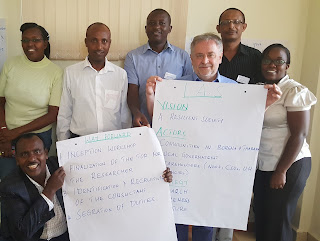BLOG POST 9: COPING WITH DIFFERENT TYPES OF SHOCKS AND STRESSES IN THARAKA
BLOG POST 9: COPING WITH DIFFERENT TYPES OF SHOCKS AND STRESSES IN THARAKA This blog post identifies common actions of local individuals and households and institutions to cope with common shocks and droughts that affect them. What do they do, for example when faced with food shortage at household level due to severe drought? What short-term and long-term coping strategies do they use? Do men and women and the different types of households use similar or different coping mechanisms? The blog seeks to answer the following questions: How do local individuals, households, and institutions cope with shocks and stresses? Why do local individuals, households, and institutions utilize these coping strategies? How is the level of knowledge among local households regarding organizations and institutions that can support them to mitigate the effects of drought and other shocks and stresses? Coping with climate-related shocks and stresses (drought and food shortages) Traditio...

Comments
Post a Comment